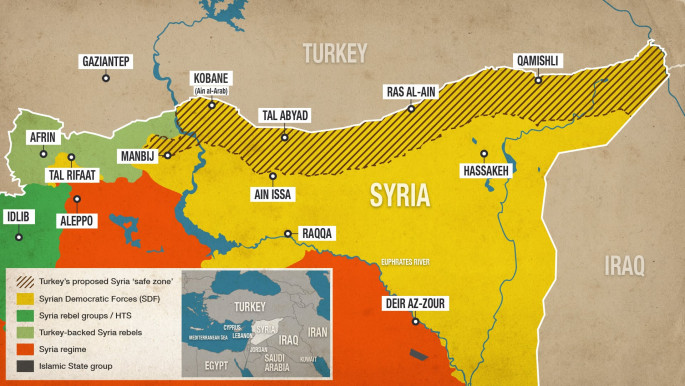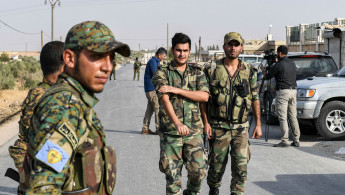Kurdish fighters leave besieged Syria town following ceasefire deal
Ankara launched a cross-border attack against Syria's Kurds on October 9 after the United States announced a military pullout from the north of the war-torn country.
A US-brokered ceasefire was announced late Thursday, giving Kurdish forces until Tuesday evening to withdraw from a "safe zone" Ankara wants to create along its southern frontier.
A Kurdish source said there was a "plan to withdraw" from Ras al-Ain, and the Syrian Observatory for Human Rights, a Britain-based war monitor, later said Kurdish forces had fully withdrawn from the border town.
Turkey's defence ministry confirmed that Kurdish fighters were leaving the town.
In a statement, it said 55 vehicles had entered Ras al-Ain and 86 had left "in the direction of Tal Tamr" to the south.
Read more: Concerns mount over US nuclear bombs in Turkey amid Syria offensive
It also said one of its troops was killed by Kurdish forces near the town of Tal Abyad.
In Ras al-Ain, an AFP reporter saw at least 50 vehicles, including ambulances, leaving the town hospital, from which flames erupted shortly after their departure.
Dozens of fighters in military attire left on pickups, passing by checkpoints manned by Ankara-allied Syrian fighters, he said.
US troops withdraw
Thursday's deal gives the SDF - the de facto army of Kurdish authorities in northeast Syria - until Tuesday evening to pull out of a 120-kilometre (70-mile) long area from Tal Abyad to Ras al-Ain along Syria's northern border.
That strip of land is to run around 30 kilometres (20 miles) deep into Syrian territory.
On Saturday, SDF commander Mazloum Abdi said Kurdish forces would withdraw from the desired buffer region as soon as they were allowed out of Ras al-Ain.
The Kurds have been a key ally to Washington in the US-backed fight against Islamic State group jihadists in Syria, but Turkey views them as "terrorists" linked to Kurdish militants on its own soil.
Earlier this month, US President Donald Trump said US special forces would be withdrawn from northern Syria, in what was widely seen as betrayal of the Kurds and a green light for a Turkish attack.
A week ago, the Pentagon said Trump had ordered the withdrawal of up to 1,000 troops from northern Syria as Turkish troops advanced into Syrian territory.
Read more: Turkey's ever-growing indigenous arms industry
Earlier on Sunday, US forces withdrew from their largest base in northern Syria, the Observatory said.
The correspondent in Tal Tamr saw more than 70 US armoured vehicles escorted by helicopters drive past the town carrying military equipment.
Some flew the American stars-and-stripes flag as they made their way eastwards along a highway crossing the town, he said.
The Observatory said the convoy was evacuating the Sarrin military base on the edge of the planned buffer zone, south of the border town of Kobane.
The vehicles appeared to be heading to the town of Hassakeh, further east, it said.
Turkey 'monitoring'
Sunday's pullout was the fourth such withdrawal of American forces in a week and left Syria's northern provinces of Aleppo and Raqa devoid of US troops, Abdel Rahman said.
Turkey and the Kurds have traded accusations the other was not abiding by the ceasefire deal brokered by US Vice President Mike Pence.
On Twitter, Trump cited Defence Secretary Mark Esper on Sunday as saying the ceasefire was "holding up very nicely".
"There are some minor skirmishes that have ended quickly. New areas being resettled with the Kurds," he said.
On Saturday, Abdi said the US was not doing enough to force Ankara to abide by the agreement, a day after Turkish-led bombardment killed 14 civilians.
He said however that his forces had resumed working with the US-led coalition against IS in the east of the country, and insisted Washington's presence in the country was important.
The violence since October 9 has killed hundreds from both sides and displaced hundreds of thousands from their homes, the Observatory says, in the latest humanitarian crisis in Syria's eight-year civil war.
The international community has warned that the incursion could force Kurdish fighters to redeploy from jails and camps where they are guarding thousands of suspected IS fighters and family members.
They fear a resurgence of the extremists, whom the SDF expelled from their last scrap of territory in March but who continue to claim deadly attacks in Kurdish-held areas.
Follow us on Twitter: @The_NewArab





 Follow the Middle East's top stories in English at The New Arab on Google News
Follow the Middle East's top stories in English at The New Arab on Google News
![The UAE is widely suspected of arming the RSF militia [Getty]](/sites/default/files/styles/image_330x185/public/2024-11/GettyImages-472529908.jpg?h=69f2b9d0&itok=Yauw3YTG)
![Netanyahu furiously denounced the ICC [Getty]](/sites/default/files/styles/image_330x185/public/2024-11/GettyImages-2169352575.jpg?h=199d8c1f&itok=-vRiruf5)
![Both Hamas and the Palestinian Authority welcomed the ICC arrest warrants [Getty]](/sites/default/files/styles/image_330x185/public/2024-11/GettyImages-2178351173.jpg?h=199d8c1f&itok=TV858iVg)